Assessing Healthcare Management of Obesity in Learning Disabilities
VerifiedAdded on 2020/11/23
|47
|13287
|254
Report
AI Summary
This report investigates healthcare management interventions for obesity among individuals with learning disabilities. It begins with an introduction outlining the study's aim, objectives, rationale, scope, and expected outcomes. The report then reviews existing literature, exploring healthcare approaches, influencing factors, and optimum practices for obesity management in this population. The methodology section describes the systematic review approach, including data collection, inclusion/exclusion criteria, and research philosophy. The findings and discussions chapter presents healthcare interventions, issues faced by obese children, government policies, and the impact of nutrition and exercise. The conclusion and recommendations chapter summarizes the research, discusses limitations, and offers suggestions for future research. The study aims to evaluate current healthcare interventions, identify effective practices, and improve the standard of living for individuals with learning disabilities and obesity.
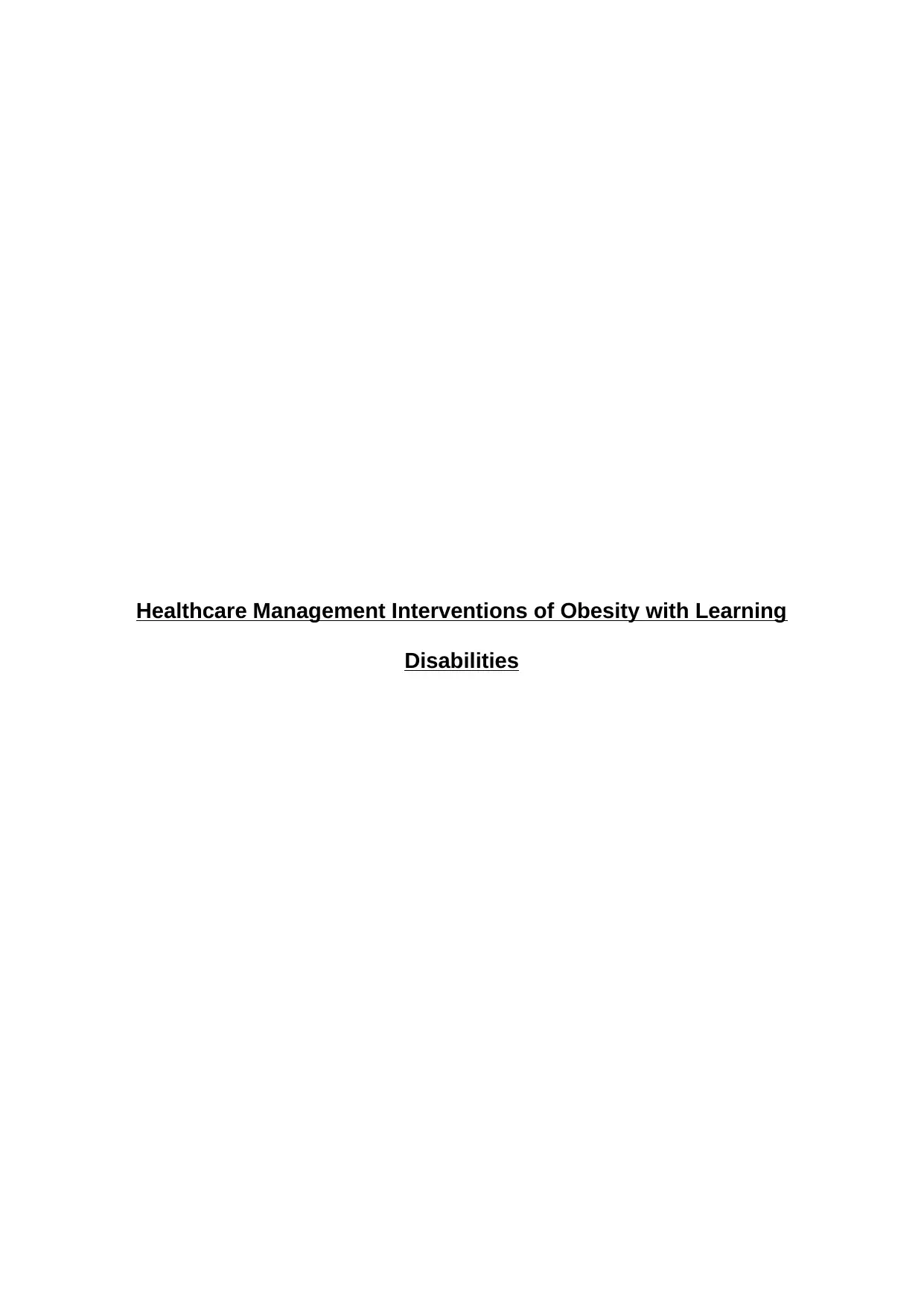
Healthcare Management Interventions of Obesity with Learning
Disabilities
Disabilities
Paraphrase This Document
Need a fresh take? Get an instant paraphrase of this document with our AI Paraphraser
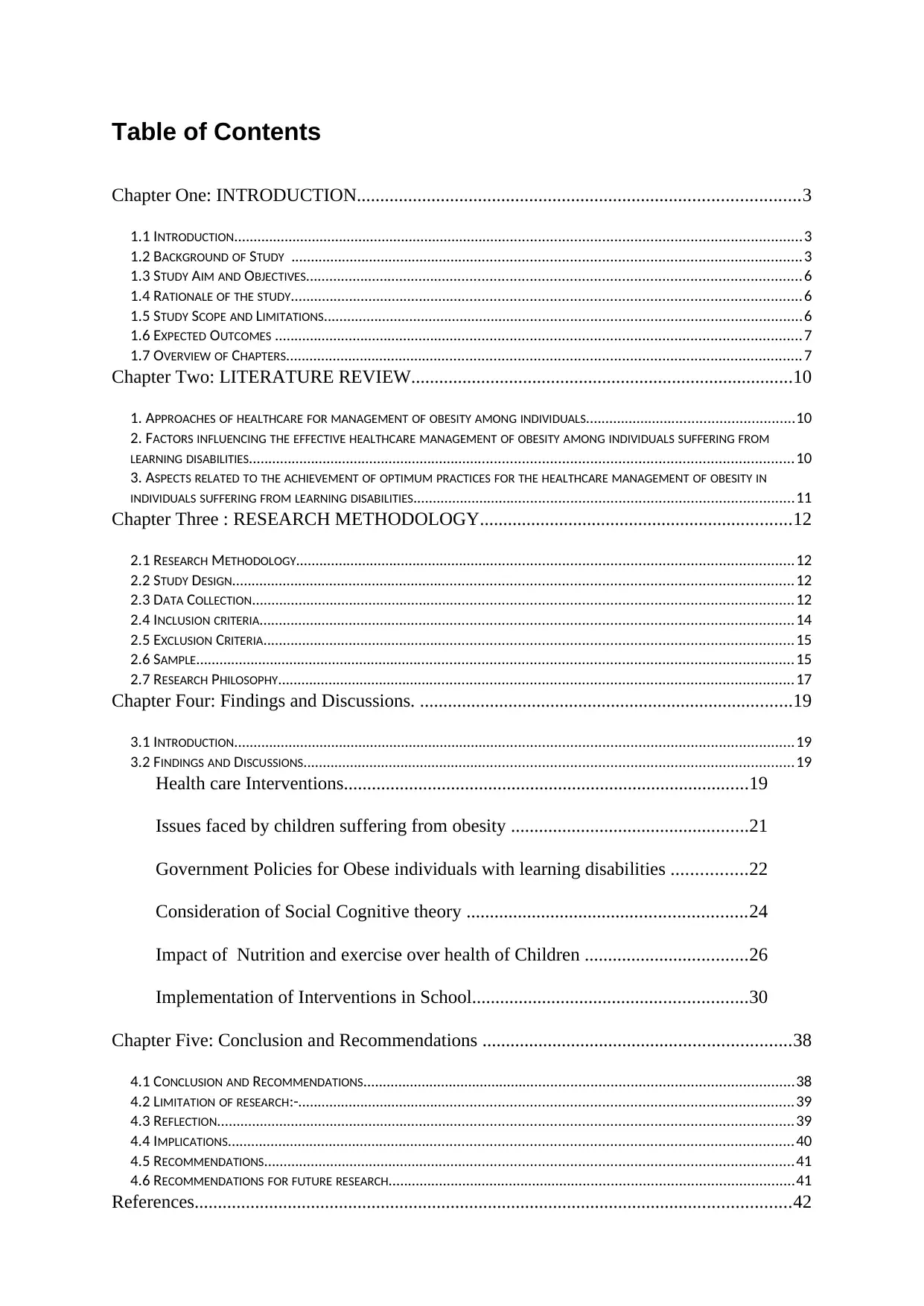
Table of Contents
Chapter One: INTRODUCTION...............................................................................................3
1.1 INTRODUCTION................................................................................................................................................3
1.2 BACKGROUND OF STUDY .................................................................................................................................3
1.3 STUDY AIM AND OBJECTIVES.............................................................................................................................6
1.4 RATIONALE OF THE STUDY.................................................................................................................................6
1.5 STUDY SCOPE AND LIMITATIONS.........................................................................................................................6
1.6 EXPECTED OUTCOMES .....................................................................................................................................7
1.7 OVERVIEW OF CHAPTERS..................................................................................................................................7
Chapter Two: LITERATURE REVIEW..................................................................................10
1. APPROACHES OF HEALTHCARE FOR MANAGEMENT OF OBESITY AMONG INDIVIDUALS.....................................................10
2. FACTORS INFLUENCING THE EFFECTIVE HEALTHCARE MANAGEMENT OF OBESITY AMONG INDIVIDUALS SUFFERING FROM
LEARNING DISABILITIES..........................................................................................................................................10
3. ASPECTS RELATED TO THE ACHIEVEMENT OF OPTIMUM PRACTICES FOR THE HEALTHCARE MANAGEMENT OF OBESITY IN
INDIVIDUALS SUFFERING FROM LEARNING DISABILITIES................................................................................................11
Chapter Three : RESEARCH METHODOLOGY...................................................................12
2.1 RESEARCH METHODOLOGY..............................................................................................................................12
2.2 STUDY DESIGN..............................................................................................................................................12
2.3 DATA COLLECTION.........................................................................................................................................12
2.4 INCLUSION CRITERIA.......................................................................................................................................14
2.5 EXCLUSION CRITERIA......................................................................................................................................15
2.6 SAMPLE.......................................................................................................................................................15
2.7 RESEARCH PHILOSOPHY..................................................................................................................................17
Chapter Four: Findings and Discussions. ................................................................................19
3.1 INTRODUCTION..............................................................................................................................................19
3.2 FINDINGS AND DISCUSSIONS............................................................................................................................19
Health care Interventions.......................................................................................19
Issues faced by children suffering from obesity ...................................................21
Government Policies for Obese individuals with learning disabilities ................22
Consideration of Social Cognitive theory ............................................................24
Impact of Nutrition and exercise over health of Children ...................................26
Implementation of Interventions in School...........................................................30
Chapter Five: Conclusion and Recommendations ..................................................................38
4.1 CONCLUSION AND RECOMMENDATIONS.............................................................................................................38
4.2 LIMITATION OF RESEARCH:-.............................................................................................................................39
4.3 REFLECTION..................................................................................................................................................39
4.4 IMPLICATIONS...............................................................................................................................................40
4.5 RECOMMENDATIONS......................................................................................................................................41
4.6 RECOMMENDATIONS FOR FUTURE RESEARCH.......................................................................................................41
References................................................................................................................................42
Chapter One: INTRODUCTION...............................................................................................3
1.1 INTRODUCTION................................................................................................................................................3
1.2 BACKGROUND OF STUDY .................................................................................................................................3
1.3 STUDY AIM AND OBJECTIVES.............................................................................................................................6
1.4 RATIONALE OF THE STUDY.................................................................................................................................6
1.5 STUDY SCOPE AND LIMITATIONS.........................................................................................................................6
1.6 EXPECTED OUTCOMES .....................................................................................................................................7
1.7 OVERVIEW OF CHAPTERS..................................................................................................................................7
Chapter Two: LITERATURE REVIEW..................................................................................10
1. APPROACHES OF HEALTHCARE FOR MANAGEMENT OF OBESITY AMONG INDIVIDUALS.....................................................10
2. FACTORS INFLUENCING THE EFFECTIVE HEALTHCARE MANAGEMENT OF OBESITY AMONG INDIVIDUALS SUFFERING FROM
LEARNING DISABILITIES..........................................................................................................................................10
3. ASPECTS RELATED TO THE ACHIEVEMENT OF OPTIMUM PRACTICES FOR THE HEALTHCARE MANAGEMENT OF OBESITY IN
INDIVIDUALS SUFFERING FROM LEARNING DISABILITIES................................................................................................11
Chapter Three : RESEARCH METHODOLOGY...................................................................12
2.1 RESEARCH METHODOLOGY..............................................................................................................................12
2.2 STUDY DESIGN..............................................................................................................................................12
2.3 DATA COLLECTION.........................................................................................................................................12
2.4 INCLUSION CRITERIA.......................................................................................................................................14
2.5 EXCLUSION CRITERIA......................................................................................................................................15
2.6 SAMPLE.......................................................................................................................................................15
2.7 RESEARCH PHILOSOPHY..................................................................................................................................17
Chapter Four: Findings and Discussions. ................................................................................19
3.1 INTRODUCTION..............................................................................................................................................19
3.2 FINDINGS AND DISCUSSIONS............................................................................................................................19
Health care Interventions.......................................................................................19
Issues faced by children suffering from obesity ...................................................21
Government Policies for Obese individuals with learning disabilities ................22
Consideration of Social Cognitive theory ............................................................24
Impact of Nutrition and exercise over health of Children ...................................26
Implementation of Interventions in School...........................................................30
Chapter Five: Conclusion and Recommendations ..................................................................38
4.1 CONCLUSION AND RECOMMENDATIONS.............................................................................................................38
4.2 LIMITATION OF RESEARCH:-.............................................................................................................................39
4.3 REFLECTION..................................................................................................................................................39
4.4 IMPLICATIONS...............................................................................................................................................40
4.5 RECOMMENDATIONS......................................................................................................................................41
4.6 RECOMMENDATIONS FOR FUTURE RESEARCH.......................................................................................................41
References................................................................................................................................42

⊘ This is a preview!⊘
Do you want full access?
Subscribe today to unlock all pages.

Trusted by 1+ million students worldwide
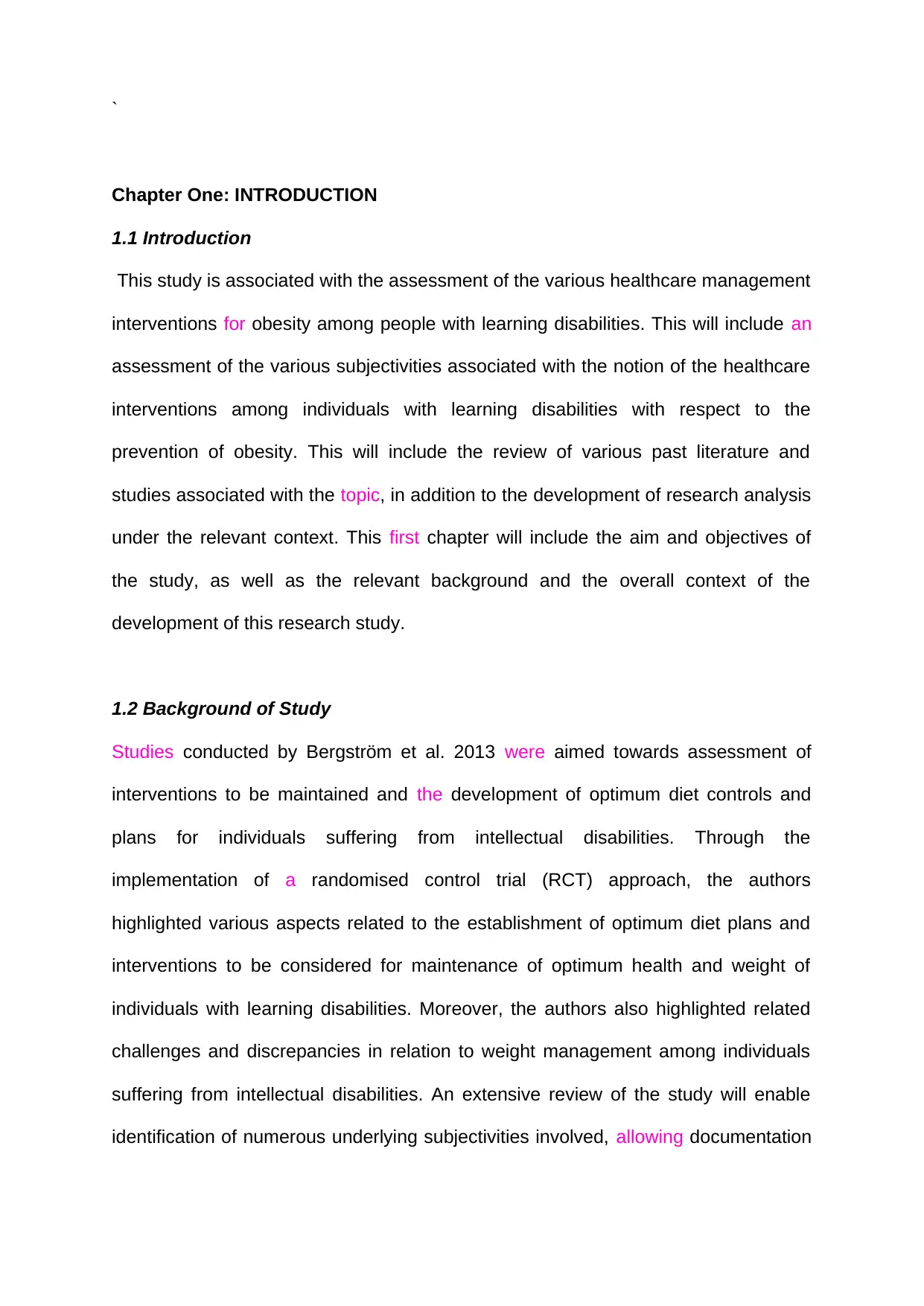
`
Chapter One: INTRODUCTION
1.1 Introduction
This study is associated with the assessment of the various healthcare management
interventions for obesity among people with learning disabilities. This will include an
assessment of the various subjectivities associated with the notion of the healthcare
interventions among individuals with learning disabilities with respect to the
prevention of obesity. This will include the review of various past literature and
studies associated with the topic, in addition to the development of research analysis
under the relevant context. This first chapter will include the aim and objectives of
the study, as well as the relevant background and the overall context of the
development of this research study.
1.2 Background of Study
Studies conducted by Bergström et al. 2013 were aimed towards assessment of
interventions to be maintained and the development of optimum diet controls and
plans for individuals suffering from intellectual disabilities. Through the
implementation of a randomised control trial (RCT) approach, the authors
highlighted various aspects related to the establishment of optimum diet plans and
interventions to be considered for maintenance of optimum health and weight of
individuals with learning disabilities. Moreover, the authors also highlighted related
challenges and discrepancies in relation to weight management among individuals
suffering from intellectual disabilities. An extensive review of the study will enable
identification of numerous underlying subjectivities involved, allowing documentation
Chapter One: INTRODUCTION
1.1 Introduction
This study is associated with the assessment of the various healthcare management
interventions for obesity among people with learning disabilities. This will include an
assessment of the various subjectivities associated with the notion of the healthcare
interventions among individuals with learning disabilities with respect to the
prevention of obesity. This will include the review of various past literature and
studies associated with the topic, in addition to the development of research analysis
under the relevant context. This first chapter will include the aim and objectives of
the study, as well as the relevant background and the overall context of the
development of this research study.
1.2 Background of Study
Studies conducted by Bergström et al. 2013 were aimed towards assessment of
interventions to be maintained and the development of optimum diet controls and
plans for individuals suffering from intellectual disabilities. Through the
implementation of a randomised control trial (RCT) approach, the authors
highlighted various aspects related to the establishment of optimum diet plans and
interventions to be considered for maintenance of optimum health and weight of
individuals with learning disabilities. Moreover, the authors also highlighted related
challenges and discrepancies in relation to weight management among individuals
suffering from intellectual disabilities. An extensive review of the study will enable
identification of numerous underlying subjectivities involved, allowing documentation
Paraphrase This Document
Need a fresh take? Get an instant paraphrase of this document with our AI Paraphraser
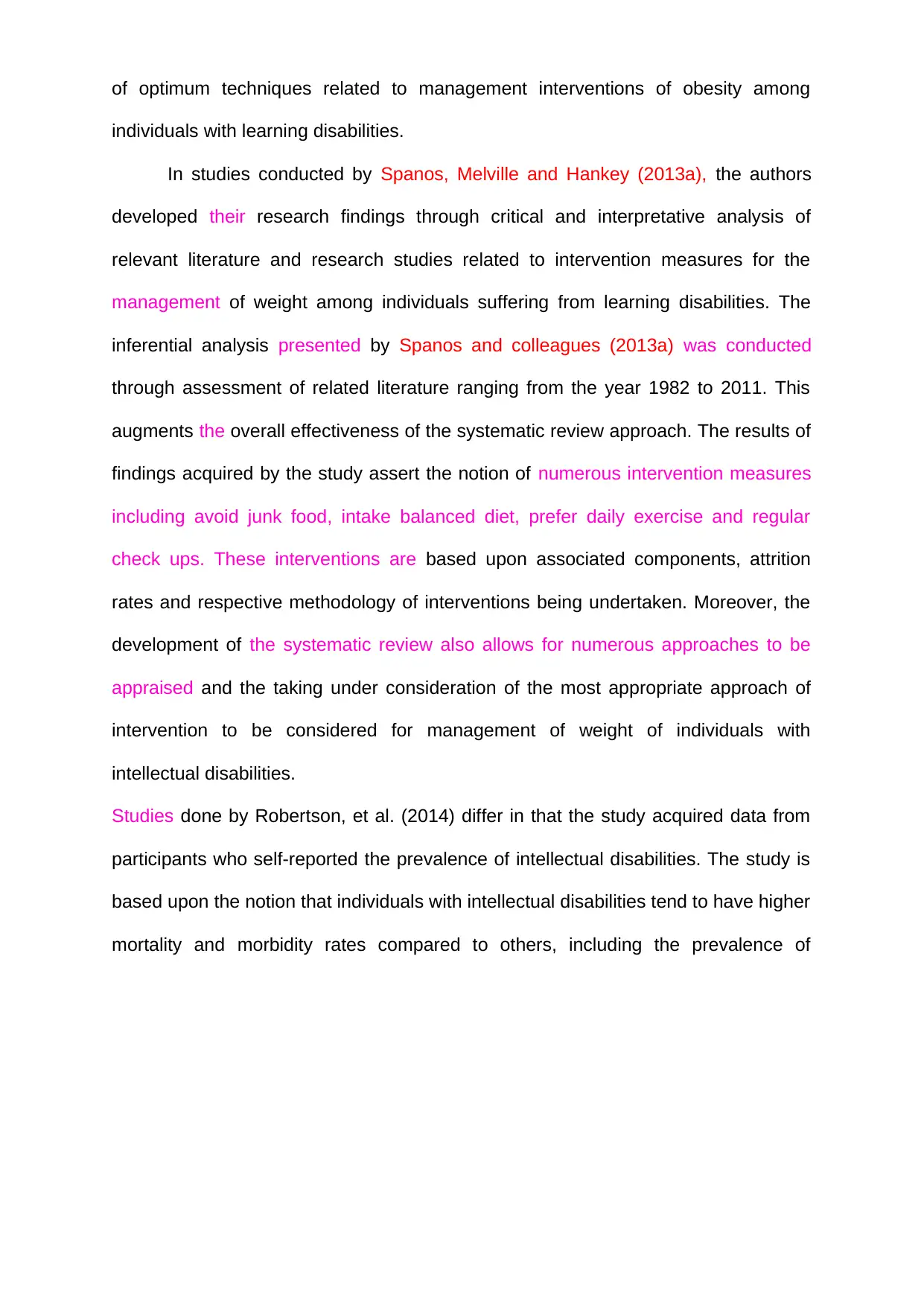
of optimum techniques related to management interventions of obesity among
individuals with learning disabilities.
In studies conducted by Spanos, Melville and Hankey (2013a), the authors
developed their research findings through critical and interpretative analysis of
relevant literature and research studies related to intervention measures for the
management of weight among individuals suffering from learning disabilities. The
inferential analysis presented by Spanos and colleagues (2013a) was conducted
through assessment of related literature ranging from the year 1982 to 2011. This
augments the overall effectiveness of the systematic review approach. The results of
findings acquired by the study assert the notion of numerous intervention measures
including avoid junk food, intake balanced diet, prefer daily exercise and regular
check ups. These interventions are based upon associated components, attrition
rates and respective methodology of interventions being undertaken. Moreover, the
development of the systematic review also allows for numerous approaches to be
appraised and the taking under consideration of the most appropriate approach of
intervention to be considered for management of weight of individuals with
intellectual disabilities.
Studies done by Robertson, et al. (2014) differ in that the study acquired data from
participants who self-reported the prevalence of intellectual disabilities. The study is
based upon the notion that individuals with intellectual disabilities tend to have higher
mortality and morbidity rates compared to others, including the prevalence of
individuals with learning disabilities.
In studies conducted by Spanos, Melville and Hankey (2013a), the authors
developed their research findings through critical and interpretative analysis of
relevant literature and research studies related to intervention measures for the
management of weight among individuals suffering from learning disabilities. The
inferential analysis presented by Spanos and colleagues (2013a) was conducted
through assessment of related literature ranging from the year 1982 to 2011. This
augments the overall effectiveness of the systematic review approach. The results of
findings acquired by the study assert the notion of numerous intervention measures
including avoid junk food, intake balanced diet, prefer daily exercise and regular
check ups. These interventions are based upon associated components, attrition
rates and respective methodology of interventions being undertaken. Moreover, the
development of the systematic review also allows for numerous approaches to be
appraised and the taking under consideration of the most appropriate approach of
intervention to be considered for management of weight of individuals with
intellectual disabilities.
Studies done by Robertson, et al. (2014) differ in that the study acquired data from
participants who self-reported the prevalence of intellectual disabilities. The study is
based upon the notion that individuals with intellectual disabilities tend to have higher
mortality and morbidity rates compared to others, including the prevalence of
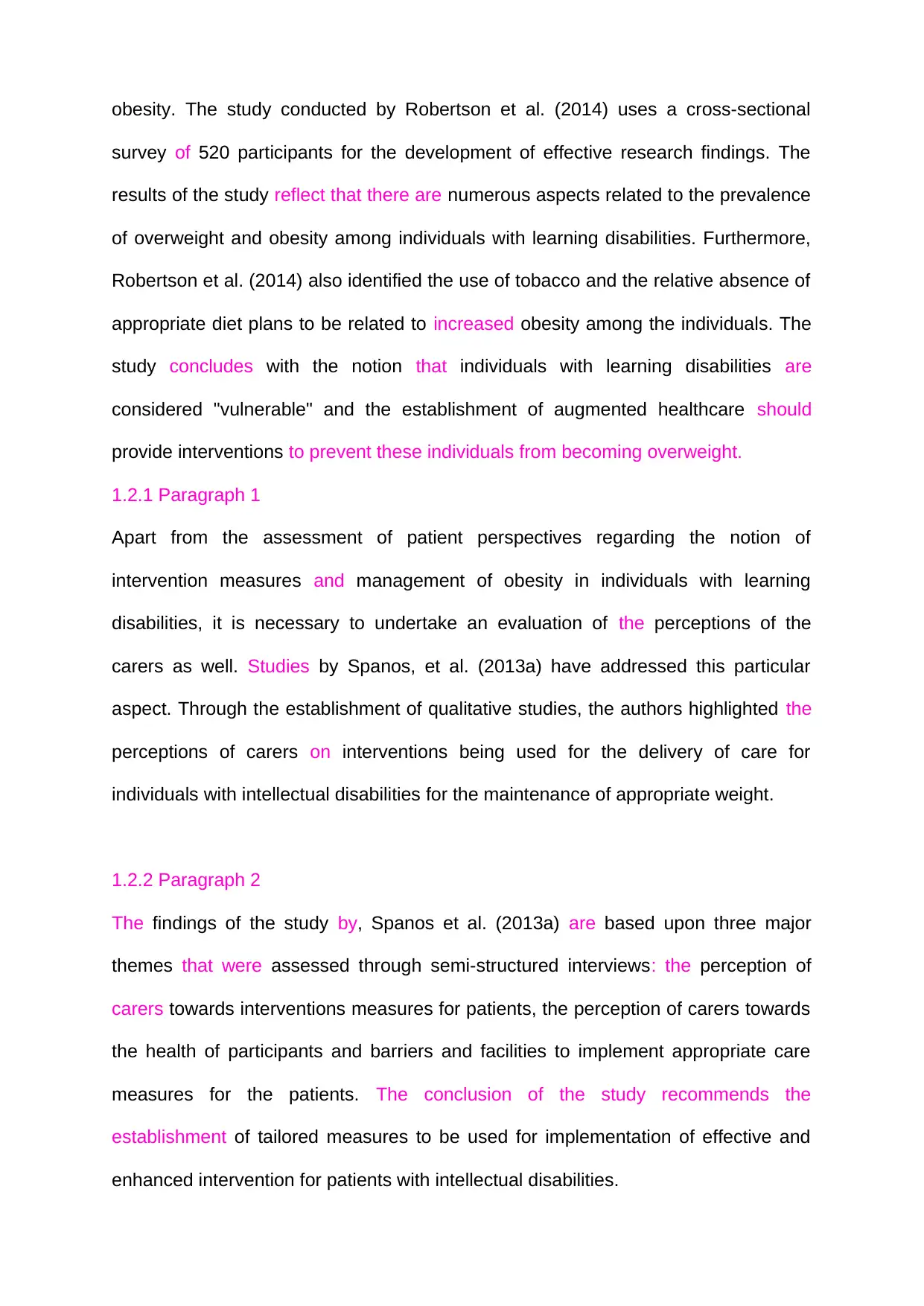
obesity. The study conducted by Robertson et al. (2014) uses a cross-sectional
survey of 520 participants for the development of effective research findings. The
results of the study reflect that there are numerous aspects related to the prevalence
of overweight and obesity among individuals with learning disabilities. Furthermore,
Robertson et al. (2014) also identified the use of tobacco and the relative absence of
appropriate diet plans to be related to increased obesity among the individuals. The
study concludes with the notion that individuals with learning disabilities are
considered "vulnerable" and the establishment of augmented healthcare should
provide interventions to prevent these individuals from becoming overweight.
1.2.1 Paragraph 1
Apart from the assessment of patient perspectives regarding the notion of
intervention measures and management of obesity in individuals with learning
disabilities, it is necessary to undertake an evaluation of the perceptions of the
carers as well. Studies by Spanos, et al. (2013a) have addressed this particular
aspect. Through the establishment of qualitative studies, the authors highlighted the
perceptions of carers on interventions being used for the delivery of care for
individuals with intellectual disabilities for the maintenance of appropriate weight.
1.2.2 Paragraph 2
The findings of the study by, Spanos et al. (2013a) are based upon three major
themes that were assessed through semi-structured interviews: the perception of
carers towards interventions measures for patients, the perception of carers towards
the health of participants and barriers and facilities to implement appropriate care
measures for the patients. The conclusion of the study recommends the
establishment of tailored measures to be used for implementation of effective and
enhanced intervention for patients with intellectual disabilities.
survey of 520 participants for the development of effective research findings. The
results of the study reflect that there are numerous aspects related to the prevalence
of overweight and obesity among individuals with learning disabilities. Furthermore,
Robertson et al. (2014) also identified the use of tobacco and the relative absence of
appropriate diet plans to be related to increased obesity among the individuals. The
study concludes with the notion that individuals with learning disabilities are
considered "vulnerable" and the establishment of augmented healthcare should
provide interventions to prevent these individuals from becoming overweight.
1.2.1 Paragraph 1
Apart from the assessment of patient perspectives regarding the notion of
intervention measures and management of obesity in individuals with learning
disabilities, it is necessary to undertake an evaluation of the perceptions of the
carers as well. Studies by Spanos, et al. (2013a) have addressed this particular
aspect. Through the establishment of qualitative studies, the authors highlighted the
perceptions of carers on interventions being used for the delivery of care for
individuals with intellectual disabilities for the maintenance of appropriate weight.
1.2.2 Paragraph 2
The findings of the study by, Spanos et al. (2013a) are based upon three major
themes that were assessed through semi-structured interviews: the perception of
carers towards interventions measures for patients, the perception of carers towards
the health of participants and barriers and facilities to implement appropriate care
measures for the patients. The conclusion of the study recommends the
establishment of tailored measures to be used for implementation of effective and
enhanced intervention for patients with intellectual disabilities.
⊘ This is a preview!⊘
Do you want full access?
Subscribe today to unlock all pages.

Trusted by 1+ million students worldwide
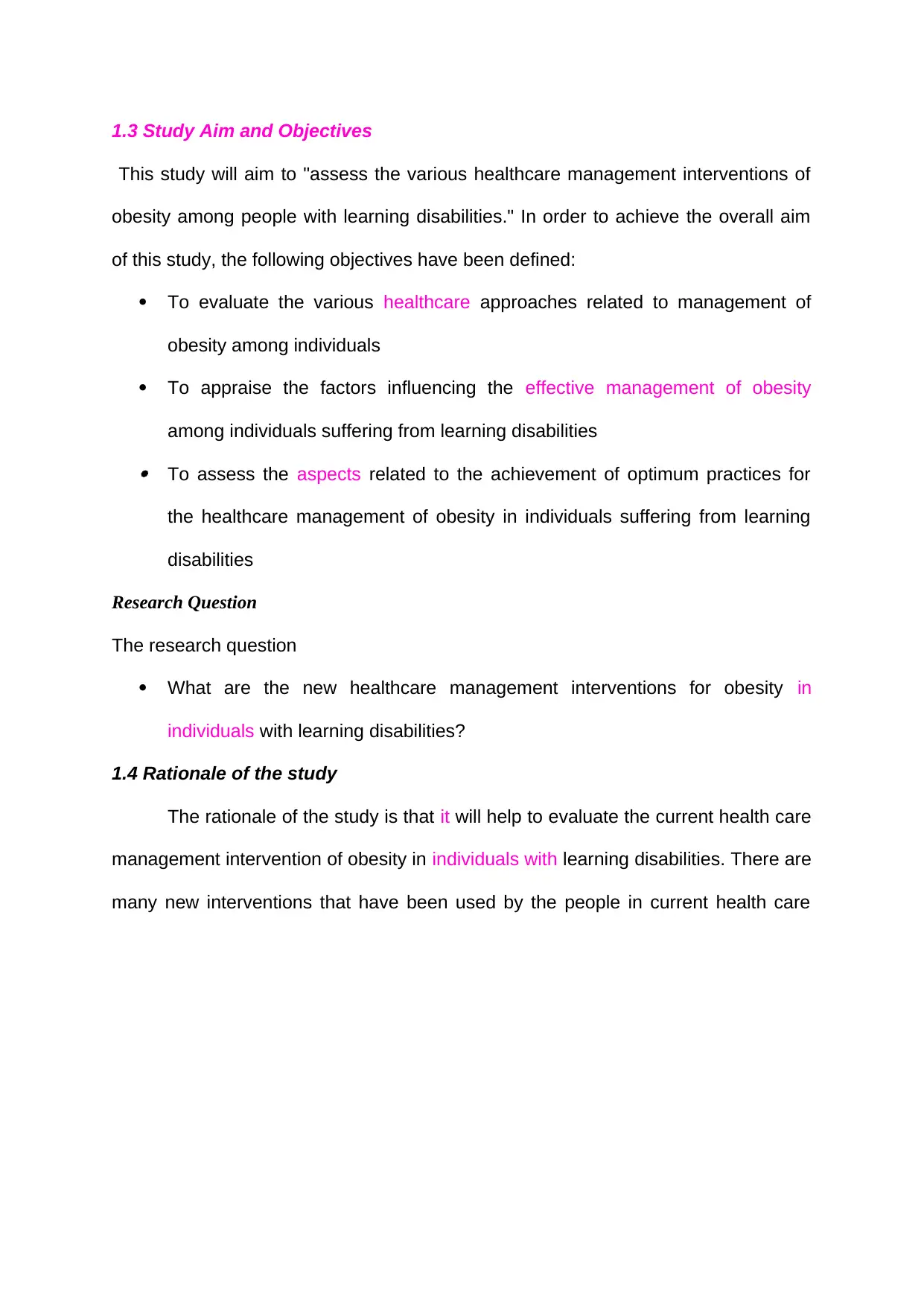
1.3 Study Aim and Objectives
This study will aim to "assess the various healthcare management interventions of
obesity among people with learning disabilities." In order to achieve the overall aim
of this study, the following objectives have been defined:
To evaluate the various healthcare approaches related to management of
obesity among individuals
To appraise the factors influencing the effective management of obesity
among individuals suffering from learning disabilities To assess the aspects related to the achievement of optimum practices for
the healthcare management of obesity in individuals suffering from learning
disabilities
Research Question
The research question
What are the new healthcare management interventions for obesity in
individuals with learning disabilities?
1.4 Rationale of the study
The rationale of the study is that it will help to evaluate the current health care
management intervention of obesity in individuals with learning disabilities. There are
many new interventions that have been used by the people in current health care
This study will aim to "assess the various healthcare management interventions of
obesity among people with learning disabilities." In order to achieve the overall aim
of this study, the following objectives have been defined:
To evaluate the various healthcare approaches related to management of
obesity among individuals
To appraise the factors influencing the effective management of obesity
among individuals suffering from learning disabilities To assess the aspects related to the achievement of optimum practices for
the healthcare management of obesity in individuals suffering from learning
disabilities
Research Question
The research question
What are the new healthcare management interventions for obesity in
individuals with learning disabilities?
1.4 Rationale of the study
The rationale of the study is that it will help to evaluate the current health care
management intervention of obesity in individuals with learning disabilities. There are
many new interventions that have been used by the people in current health care
Paraphrase This Document
Need a fresh take? Get an instant paraphrase of this document with our AI Paraphraser
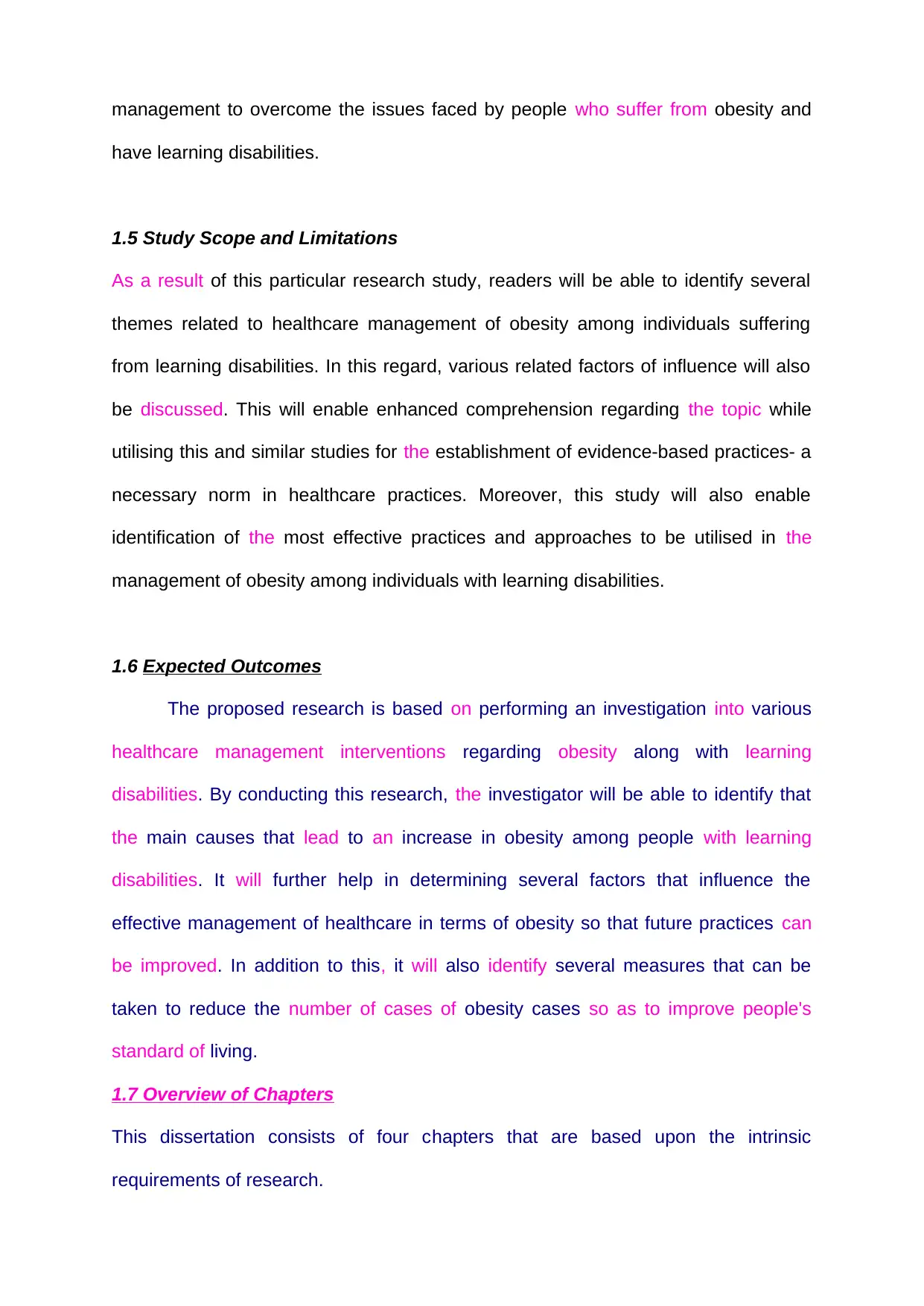
management to overcome the issues faced by people who suffer from obesity and
have learning disabilities.
1.5 Study Scope and Limitations
As a result of this particular research study, readers will be able to identify several
themes related to healthcare management of obesity among individuals suffering
from learning disabilities. In this regard, various related factors of influence will also
be discussed. This will enable enhanced comprehension regarding the topic while
utilising this and similar studies for the establishment of evidence-based practices- a
necessary norm in healthcare practices. Moreover, this study will also enable
identification of the most effective practices and approaches to be utilised in the
management of obesity among individuals with learning disabilities.
1.6 Expected Outcomes
The proposed research is based on performing an investigation into various
healthcare management interventions regarding obesity along with learning
disabilities. By conducting this research, the investigator will be able to identify that
the main causes that lead to an increase in obesity among people with learning
disabilities. It will further help in determining several factors that influence the
effective management of healthcare in terms of obesity so that future practices can
be improved. In addition to this, it will also identify several measures that can be
taken to reduce the number of cases of obesity cases so as to improve people's
standard of living.
1.7 Overview of Chapters
This dissertation consists of four chapters that are based upon the intrinsic
requirements of research.
have learning disabilities.
1.5 Study Scope and Limitations
As a result of this particular research study, readers will be able to identify several
themes related to healthcare management of obesity among individuals suffering
from learning disabilities. In this regard, various related factors of influence will also
be discussed. This will enable enhanced comprehension regarding the topic while
utilising this and similar studies for the establishment of evidence-based practices- a
necessary norm in healthcare practices. Moreover, this study will also enable
identification of the most effective practices and approaches to be utilised in the
management of obesity among individuals with learning disabilities.
1.6 Expected Outcomes
The proposed research is based on performing an investigation into various
healthcare management interventions regarding obesity along with learning
disabilities. By conducting this research, the investigator will be able to identify that
the main causes that lead to an increase in obesity among people with learning
disabilities. It will further help in determining several factors that influence the
effective management of healthcare in terms of obesity so that future practices can
be improved. In addition to this, it will also identify several measures that can be
taken to reduce the number of cases of obesity cases so as to improve people's
standard of living.
1.7 Overview of Chapters
This dissertation consists of four chapters that are based upon the intrinsic
requirements of research.
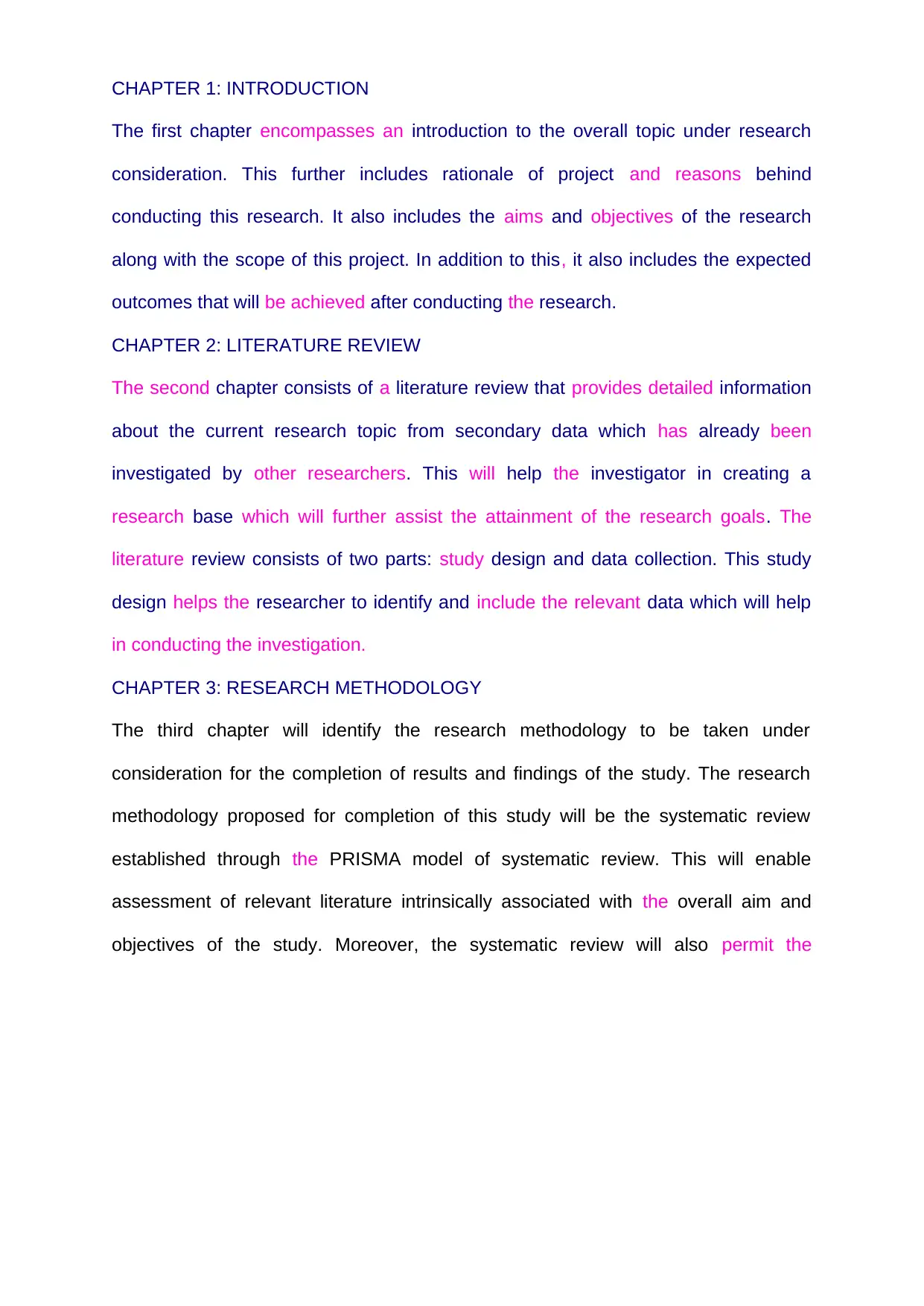
CHAPTER 1: INTRODUCTION
The first chapter encompasses an introduction to the overall topic under research
consideration. This further includes rationale of project and reasons behind
conducting this research. It also includes the aims and objectives of the research
along with the scope of this project. In addition to this, it also includes the expected
outcomes that will be achieved after conducting the research.
CHAPTER 2: LITERATURE REVIEW
The second chapter consists of a literature review that provides detailed information
about the current research topic from secondary data which has already been
investigated by other researchers. This will help the investigator in creating a
research base which will further assist the attainment of the research goals. The
literature review consists of two parts: study design and data collection. This study
design helps the researcher to identify and include the relevant data which will help
in conducting the investigation.
CHAPTER 3: RESEARCH METHODOLOGY
The third chapter will identify the research methodology to be taken under
consideration for the completion of results and findings of the study. The research
methodology proposed for completion of this study will be the systematic review
established through the PRISMA model of systematic review. This will enable
assessment of relevant literature intrinsically associated with the overall aim and
objectives of the study. Moreover, the systematic review will also permit the
The first chapter encompasses an introduction to the overall topic under research
consideration. This further includes rationale of project and reasons behind
conducting this research. It also includes the aims and objectives of the research
along with the scope of this project. In addition to this, it also includes the expected
outcomes that will be achieved after conducting the research.
CHAPTER 2: LITERATURE REVIEW
The second chapter consists of a literature review that provides detailed information
about the current research topic from secondary data which has already been
investigated by other researchers. This will help the investigator in creating a
research base which will further assist the attainment of the research goals. The
literature review consists of two parts: study design and data collection. This study
design helps the researcher to identify and include the relevant data which will help
in conducting the investigation.
CHAPTER 3: RESEARCH METHODOLOGY
The third chapter will identify the research methodology to be taken under
consideration for the completion of results and findings of the study. The research
methodology proposed for completion of this study will be the systematic review
established through the PRISMA model of systematic review. This will enable
assessment of relevant literature intrinsically associated with the overall aim and
objectives of the study. Moreover, the systematic review will also permit the
⊘ This is a preview!⊘
Do you want full access?
Subscribe today to unlock all pages.

Trusted by 1+ million students worldwide
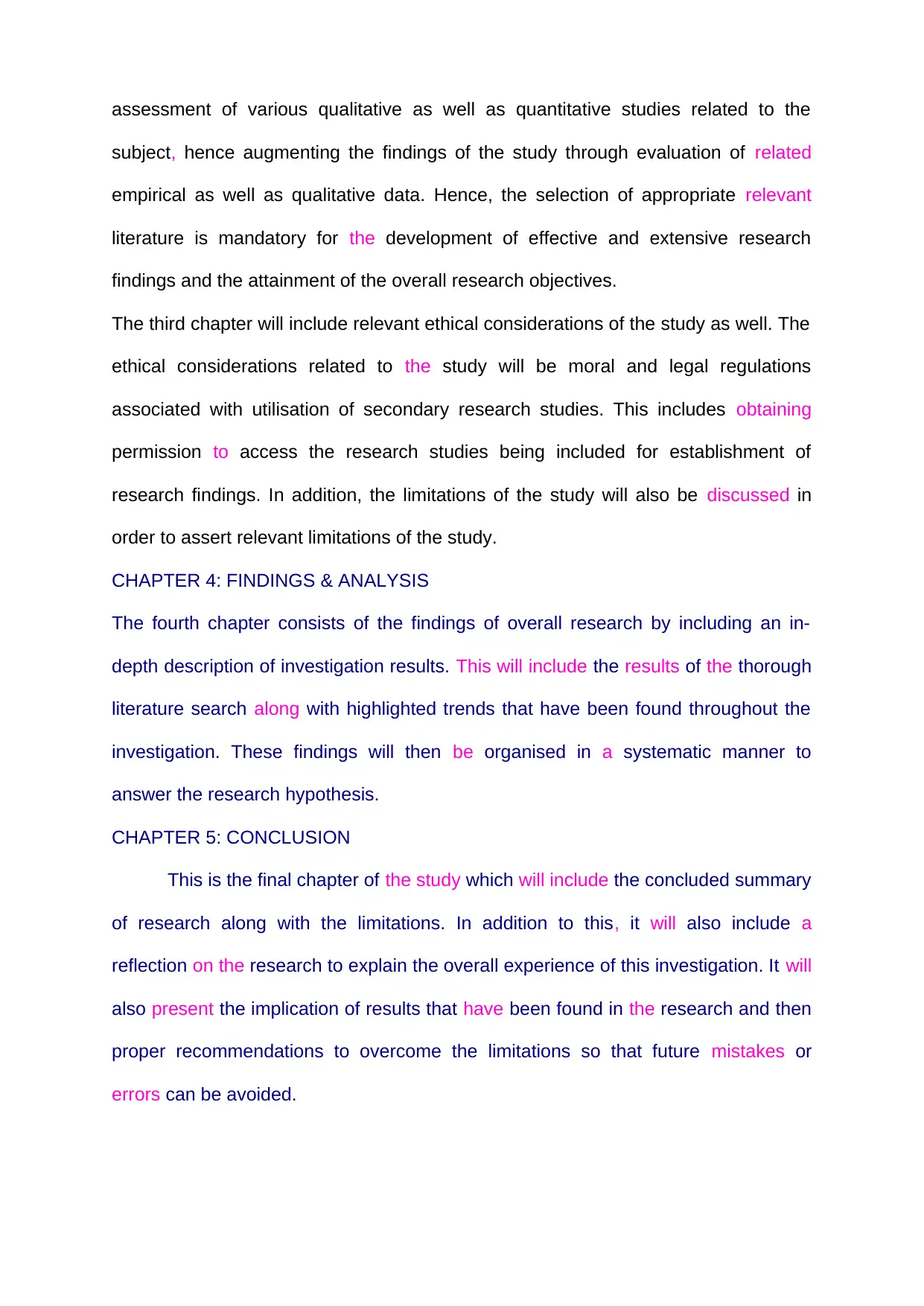
assessment of various qualitative as well as quantitative studies related to the
subject, hence augmenting the findings of the study through evaluation of related
empirical as well as qualitative data. Hence, the selection of appropriate relevant
literature is mandatory for the development of effective and extensive research
findings and the attainment of the overall research objectives.
The third chapter will include relevant ethical considerations of the study as well. The
ethical considerations related to the study will be moral and legal regulations
associated with utilisation of secondary research studies. This includes obtaining
permission to access the research studies being included for establishment of
research findings. In addition, the limitations of the study will also be discussed in
order to assert relevant limitations of the study.
CHAPTER 4: FINDINGS & ANALYSIS
The fourth chapter consists of the findings of overall research by including an in-
depth description of investigation results. This will include the results of the thorough
literature search along with highlighted trends that have been found throughout the
investigation. These findings will then be organised in a systematic manner to
answer the research hypothesis.
CHAPTER 5: CONCLUSION
This is the final chapter of the study which will include the concluded summary
of research along with the limitations. In addition to this, it will also include a
reflection on the research to explain the overall experience of this investigation. It will
also present the implication of results that have been found in the research and then
proper recommendations to overcome the limitations so that future mistakes or
errors can be avoided.
subject, hence augmenting the findings of the study through evaluation of related
empirical as well as qualitative data. Hence, the selection of appropriate relevant
literature is mandatory for the development of effective and extensive research
findings and the attainment of the overall research objectives.
The third chapter will include relevant ethical considerations of the study as well. The
ethical considerations related to the study will be moral and legal regulations
associated with utilisation of secondary research studies. This includes obtaining
permission to access the research studies being included for establishment of
research findings. In addition, the limitations of the study will also be discussed in
order to assert relevant limitations of the study.
CHAPTER 4: FINDINGS & ANALYSIS
The fourth chapter consists of the findings of overall research by including an in-
depth description of investigation results. This will include the results of the thorough
literature search along with highlighted trends that have been found throughout the
investigation. These findings will then be organised in a systematic manner to
answer the research hypothesis.
CHAPTER 5: CONCLUSION
This is the final chapter of the study which will include the concluded summary
of research along with the limitations. In addition to this, it will also include a
reflection on the research to explain the overall experience of this investigation. It will
also present the implication of results that have been found in the research and then
proper recommendations to overcome the limitations so that future mistakes or
errors can be avoided.
Paraphrase This Document
Need a fresh take? Get an instant paraphrase of this document with our AI Paraphraser
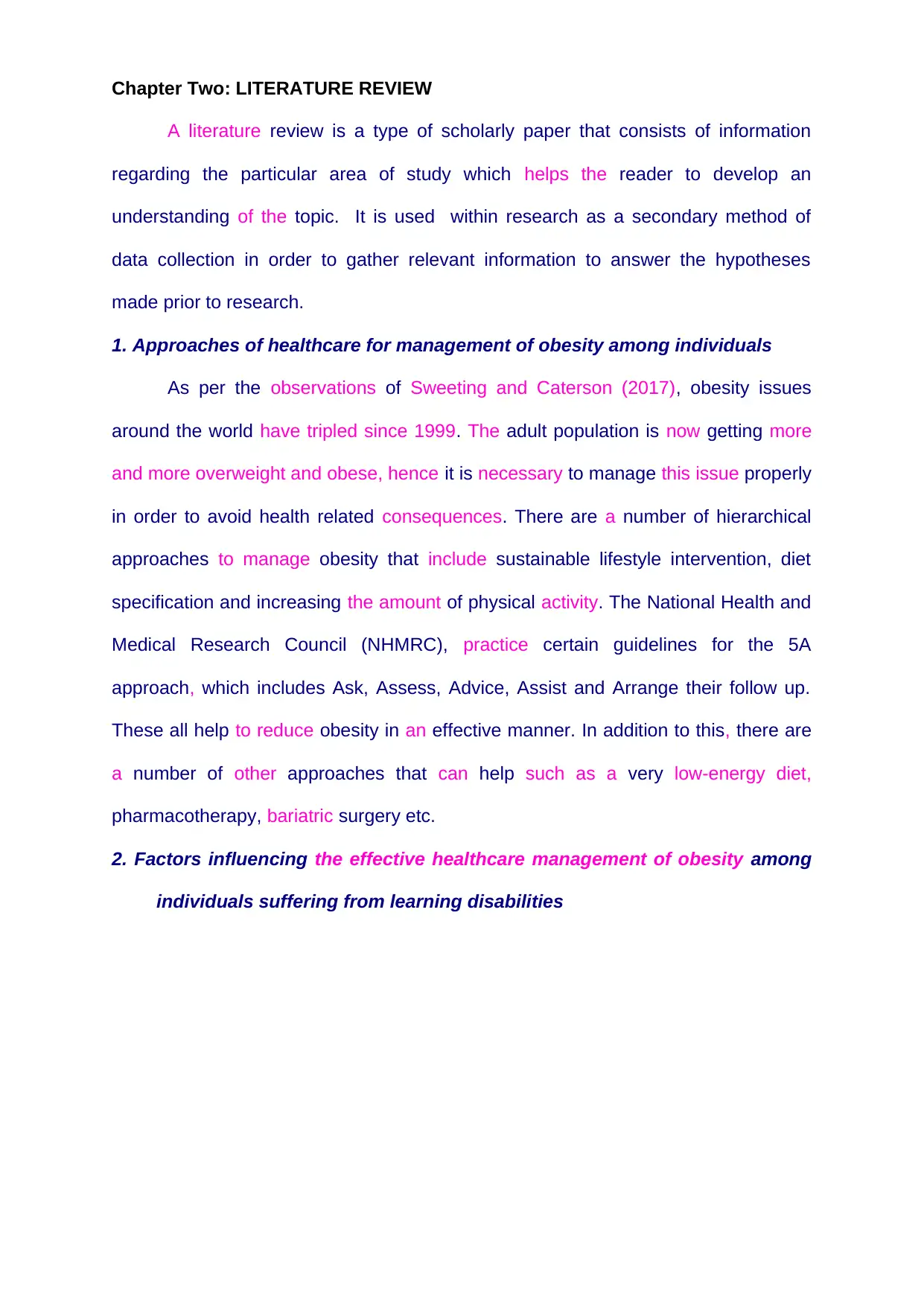
Chapter Two: LITERATURE REVIEW
A literature review is a type of scholarly paper that consists of information
regarding the particular area of study which helps the reader to develop an
understanding of the topic. It is used within research as a secondary method of
data collection in order to gather relevant information to answer the hypotheses
made prior to research.
1. Approaches of healthcare for management of obesity among individuals
As per the observations of Sweeting and Caterson (2017), obesity issues
around the world have tripled since 1999. The adult population is now getting more
and more overweight and obese, hence it is necessary to manage this issue properly
in order to avoid health related consequences. There are a number of hierarchical
approaches to manage obesity that include sustainable lifestyle intervention, diet
specification and increasing the amount of physical activity. The National Health and
Medical Research Council (NHMRC), practice certain guidelines for the 5A
approach, which includes Ask, Assess, Advice, Assist and Arrange their follow up.
These all help to reduce obesity in an effective manner. In addition to this, there are
a number of other approaches that can help such as a very low-energy diet,
pharmacotherapy, bariatric surgery etc.
2. Factors influencing the effective healthcare management of obesity among
individuals suffering from learning disabilities
A literature review is a type of scholarly paper that consists of information
regarding the particular area of study which helps the reader to develop an
understanding of the topic. It is used within research as a secondary method of
data collection in order to gather relevant information to answer the hypotheses
made prior to research.
1. Approaches of healthcare for management of obesity among individuals
As per the observations of Sweeting and Caterson (2017), obesity issues
around the world have tripled since 1999. The adult population is now getting more
and more overweight and obese, hence it is necessary to manage this issue properly
in order to avoid health related consequences. There are a number of hierarchical
approaches to manage obesity that include sustainable lifestyle intervention, diet
specification and increasing the amount of physical activity. The National Health and
Medical Research Council (NHMRC), practice certain guidelines for the 5A
approach, which includes Ask, Assess, Advice, Assist and Arrange their follow up.
These all help to reduce obesity in an effective manner. In addition to this, there are
a number of other approaches that can help such as a very low-energy diet,
pharmacotherapy, bariatric surgery etc.
2. Factors influencing the effective healthcare management of obesity among
individuals suffering from learning disabilities
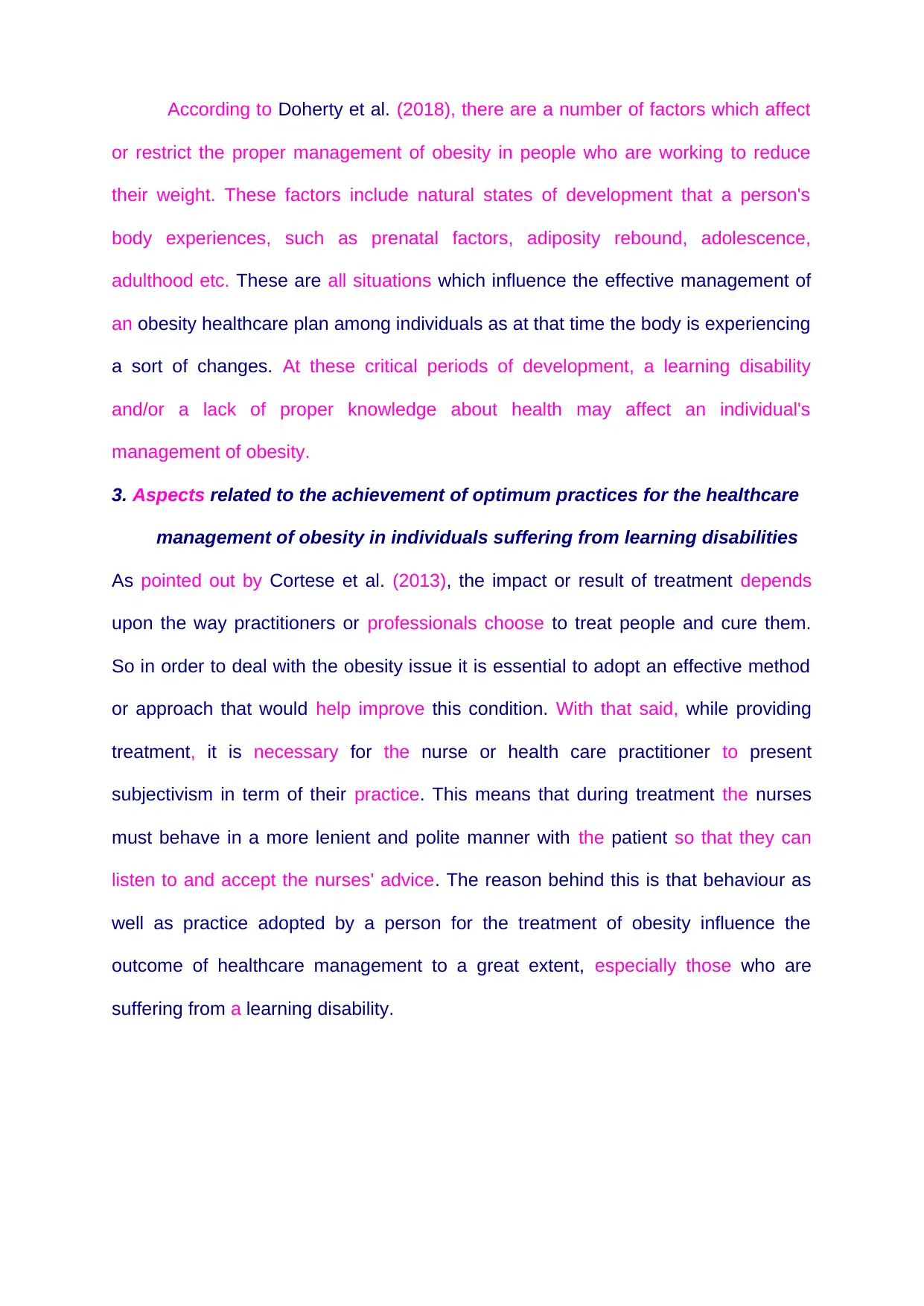
According to Doherty et al. (2018), there are a number of factors which affect
or restrict the proper management of obesity in people who are working to reduce
their weight. These factors include natural states of development that a person's
body experiences, such as prenatal factors, adiposity rebound, adolescence,
adulthood etc. These are all situations which influence the effective management of
an obesity healthcare plan among individuals as at that time the body is experiencing
a sort of changes. At these critical periods of development, a learning disability
and/or a lack of proper knowledge about health may affect an individual's
management of obesity.
3. Aspects related to the achievement of optimum practices for the healthcare
management of obesity in individuals suffering from learning disabilities
As pointed out by Cortese et al. (2013), the impact or result of treatment depends
upon the way practitioners or professionals choose to treat people and cure them.
So in order to deal with the obesity issue it is essential to adopt an effective method
or approach that would help improve this condition. With that said, while providing
treatment, it is necessary for the nurse or health care practitioner to present
subjectivism in term of their practice. This means that during treatment the nurses
must behave in a more lenient and polite manner with the patient so that they can
listen to and accept the nurses' advice. The reason behind this is that behaviour as
well as practice adopted by a person for the treatment of obesity influence the
outcome of healthcare management to a great extent, especially those who are
suffering from a learning disability.
or restrict the proper management of obesity in people who are working to reduce
their weight. These factors include natural states of development that a person's
body experiences, such as prenatal factors, adiposity rebound, adolescence,
adulthood etc. These are all situations which influence the effective management of
an obesity healthcare plan among individuals as at that time the body is experiencing
a sort of changes. At these critical periods of development, a learning disability
and/or a lack of proper knowledge about health may affect an individual's
management of obesity.
3. Aspects related to the achievement of optimum practices for the healthcare
management of obesity in individuals suffering from learning disabilities
As pointed out by Cortese et al. (2013), the impact or result of treatment depends
upon the way practitioners or professionals choose to treat people and cure them.
So in order to deal with the obesity issue it is essential to adopt an effective method
or approach that would help improve this condition. With that said, while providing
treatment, it is necessary for the nurse or health care practitioner to present
subjectivism in term of their practice. This means that during treatment the nurses
must behave in a more lenient and polite manner with the patient so that they can
listen to and accept the nurses' advice. The reason behind this is that behaviour as
well as practice adopted by a person for the treatment of obesity influence the
outcome of healthcare management to a great extent, especially those who are
suffering from a learning disability.
⊘ This is a preview!⊘
Do you want full access?
Subscribe today to unlock all pages.

Trusted by 1+ million students worldwide
1 out of 47
Related Documents
Your All-in-One AI-Powered Toolkit for Academic Success.
+13062052269
info@desklib.com
Available 24*7 on WhatsApp / Email
![[object Object]](/_next/static/media/star-bottom.7253800d.svg)
Unlock your academic potential
Copyright © 2020–2026 A2Z Services. All Rights Reserved. Developed and managed by ZUCOL.





